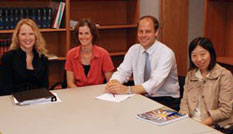 Once considered to be a strictly “adult” disease, multiple sclerosis (MS) is now being diagnosed more often in children. At our Pediatric Multiple Sclerosis and Related Disorders Program at Boston Children’s Hospital, we care for children and teens with MS as well as acute disseminated encephalomyelitis (ADEM), acute transverse myelitis (ATM), and optic neuritis.
Once considered to be a strictly “adult” disease, multiple sclerosis (MS) is now being diagnosed more often in children. At our Pediatric Multiple Sclerosis and Related Disorders Program at Boston Children’s Hospital, we care for children and teens with MS as well as acute disseminated encephalomyelitis (ADEM), acute transverse myelitis (ATM), and optic neuritis.
Distinguishing MS from the related conditions can be difficult, and the way the disease progresses tends to be different in children compared to adults. We have expertise in evaluating children’s symptoms and providing treatment that is carefully tailored to their individual conditions.
Our program is designed both to meet your child’s medical needs and to provide psychological and educational support. In addition to our neurologist and nursing staff, our team includes:
- a psychologist who can help your child as he copes with his disease
- a neuropsychologist and an educational liaison who support your child’s educational needs
- a social worker who can help your family connect with resources in your community
Our team is dedicated to giving your child and family the support you need to manage his or her condition.
Our program is connected to our Pediatric Neuro-immunology Program at Boston Children’s.
Our expertise
At our Pediatric Multiple Sclerosis and Related Disorders Program, we care for children and teens who have MS, ADEM, ATM, and optic neuritis.
All of these conditions are “autoimmune” disorders, in which the immune system attacks healthy tissue in the central nervous system — the brain, spinal cord, and optic nerves. They damage myelin, the protective covering of nerves, so they are also called “demyelinating” disorders. ADEM, ATM, and optic neuritis are conditions that typically occur only once. MS is a chronic condition.
MS and the one-time disorders can often look very similar. We carefully evaluate children to provide an accurate diagnosis, and then continue to provide close follow-up care.
At your first visit with us at Boston Children's, your child will be evaluated by child neurologist Mark Gorman, MD, who will review your child’s medical history and conduct a thorough neurological exam. He may order additional tests to help diagnose your child’s condition, including:
- blood tests
- brain and spine MRI
- spinal tap (lumbar puncture)
- EEG
Multiple sclerosis (MS)
In most children with MS, symptoms start in a “relapsing-remitting” course — attacks (relapses) of symptoms that go away (remit) and then come back.
We use a variety of drugs in order to:
- treat the attacks themselves
- prevent new attacks
- manage any symptoms that linger between attacks
We will watch your child’s symptoms closely and consider different medications if needed. We make every effort to keep symptoms in check so that your child can avoid unnecessary hospitalizations. At the same time, we choose treatment plans carefully to minimize side effects.
If your child has symptoms such as fatigue, weakness, numbness, and muscle stiffness between attacks, physical and occupational therapy can help.
Coping with MS can be especially difficult for children and teens, and they sometimes have depression. The psychologist on our team at Boston Children's can be a big help. See the our innovative approach tab to learn more about how our program works to help children with the many different challenges they can face.
Throughout your child’s treatment, we stay in communication with your pediatrician. And because MS is a chronic disease, once your child reaches adulthood we will help him transition to adult specialists.
Acute disorders
ADEM, ATM, and optic neuritis involve a brief but intense attack of symptoms.
Testing and treatment for these attacks usually requires your child to be hospitalized for one to two weeks. After he or she is discharged, s/he may need to spend time at a rehabilitation hospital to work on strength and balance, or he may go straight home and work with a physical therapist.
These attacks are typically one-time events, but we will provide close follow-up to reduce relapses and ongoing symptoms.
Your child’s learning and education
Some children and teens with MS have cognitive problems, such as trouble with paying attention and learning. The neuropsychologist on our team at Boston Children's Hospital performs specialized cognitive assessments to look for any difficulties, and our educational liaison can translate those test results into individualized educational recommendations. See the our innovative approach tab to learn more.
When a child or teenager has MS, he or she — and your whole family — face a lot of challenges. We’ve added two new people to our MS and Related Disorders team at Boston Children's Hospital who can help: psychologist Lauren Mednick, PhD, who can talk with your child when he or she comes for medical appointments, and nurse practitioner Lisa Duffy, who plays a key role in coordinating patient care. Learn more on the our innovative approach tab of this page.


